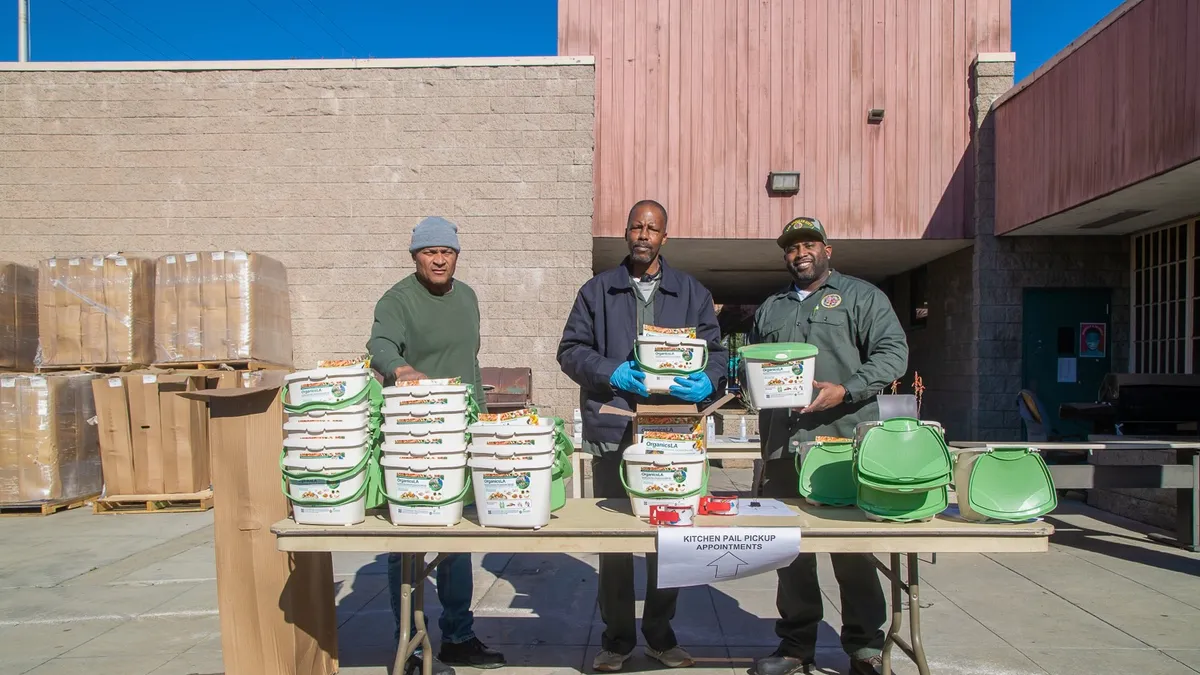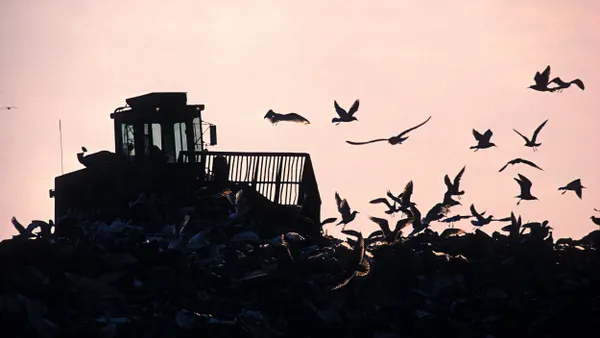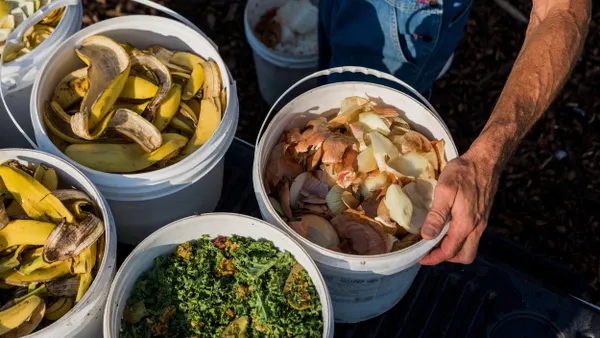Dive Brief:
- Los Angeles launched citywide organics collection last week, with all 740,000 residential accounts serviced by LA Sanitation & Environment (including single-family homes and some multifamily buildings) now able to commingle food and yard waste in their green carts.
- To support this program, the Los Angeles Board of Public Works recently approved composting contracts with WM, Recology and Athens Services collectively worth up to $1.67 billion over a 15-year period. Initial contract terms run for five years, with possible extensions.
- LASAN hopes to collect 3,000 tons of commingled material per day by the end of that initial five years. The city has recently been collecting around 1,600 to 1,800 tons per day. This volume primarily comes from existing service for green waste, but also includes some commingled food scraps from pilot areas.
Dive Insight:
Los Angeles has been working to scale up its food waste collection program in recent years, in part to comply with California’s SB 1383 law which now requires local jurisdictions to offer organics collection service. That policy aims to reduce organic waste disposal 75% by 2025, which has been described by CalRecycle as an “uphill battle” in part due to pandemic setbacks.
Los Angeles already has a residential green waste program and and has turned its focus to adding food scraps to the mix. This included a pilot for 18,000 accounts in 2019 that expanded to 40,000 accounts in 2022. LASAN initially contracted with CR&R Environmental Services to digest its material and later pivoted to composting with Recology for last year’s expansion.
The city received eight processing submissions to its latest request for proposals. Additional bids came from Anaergia, CR&R, Enviro-Pac, StormFisher and True North. LASAN is in negotiations with Anaergia to potentially install pre-processing equipment at a city-owned transfer station, which would prepare material for anaerobic digestion. LASAN has also been authorized to consult with Enviro-Pac on possible use of other digestion technology.
LASAN’s final decisions were based in part on cost and readiness to launch. The city has also worked with each of the three selected vendors on contracts in the past.
"With SB 1383 kicking in we had to contract with companies that are ready to hit the ground running,” said Alex Helou, an assistant director for solid resources program development at LASAN. "As we started increasing, we wanted to have partners who were able to continue that journey with us."
WM’s initial contract term is worth $157.7 million, with the company expected to handle a minimum of 300 tons per day at various facilities. Athens’ initial term is worth $147.4 million to handle up to 1,500 tons per day at locations including its American Organics site. Recology’s initial term is worth $54 million to handle up to 1,500 tons per day at its Blossom Valley Organics South site. Each contract includes varying agreements around transfer station locations, transportation and contamination fees.
"If there's a higher contamination then there will be a higher fee,” said Helou, who noted Recology found only a 5% contamination rate in material from last year’s pilot expansion. “We don't expect it to be significantly more because our education is focusing on the select kinds of material that can go into the green bin.”
LASAN is offering free kitchen pails to collect food scraps — with multilingual educational materials inside — at agency locations and for home delivery upon request. Helou said around 4,200 people have requested pails this week, and local council members are also helping with distribution.
Minimizing contamination will be key to keeping costs in line for a program that is inherently more expensive. The city was once paying in the range of $45-60 per ton to compost its green waste, but that amount has grown to around $110-120 per ton to compost green waste commingled with food scraps. Los Angeles currently pays an estimated $45 per ton to dispose of material via a landfill agreement with Republic Services.
Beyond complying with SB 1383, the city’s program is also seen as a way to advance progress on its goal of 90% overall waste diversion by 2025. Another piece of that goal will be to further expand organics collection among the commercial and larger multifamily accounts handled by private haulers in the city’s RecycLA franchise system.
Helou said an estimated 7,000 of RecycLA’s 65,000 accounts had signed up for organics service as of Jan. 1, including many of its largest generators. Franchise haulers — including WM, Republic and Athens — are contractually required to meet disposal reduction targets or face possible liquidated damages. LASAN expects to provide an update on these efforts in the spring.












